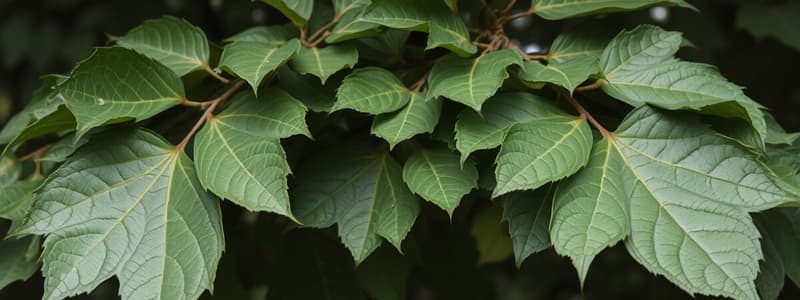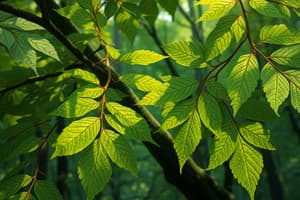Podcast
Questions and Answers
Which tree type retains its foliage all year round, except for a specific exception?
Which tree type retains its foliage all year round, except for a specific exception?
- Conifer trees (correct)
- Broadleaf trees
- Birch trees
- Deciduous trees
What feature helps differentiate pine tree needles from those of cedars and larches?
What feature helps differentiate pine tree needles from those of cedars and larches?
- Their aroma
- Their color
- Their clustering behavior (correct)
- Their length
Which type of leaves are NOT typically found on broadleaf trees?
Which type of leaves are NOT typically found on broadleaf trees?
- Needle-like leaves (correct)
- Simple leaves
- Compound leaves
- Heart-shaped leaves
Which leaf shape is indicative of an oak tree in Britain?
Which leaf shape is indicative of an oak tree in Britain?
Which two types of tree classifications were mentioned as having different leaf characteristics?
Which two types of tree classifications were mentioned as having different leaf characteristics?
What characteristic of larch trees makes them distinct from other trees?
What characteristic of larch trees makes them distinct from other trees?
Which of the following features indicates that a tree is an oak?
Which of the following features indicates that a tree is an oak?
Which description of beech tree bark is correct?
Which description of beech tree bark is correct?
How can you identify fir cones in comparison to pine cones?
How can you identify fir cones in comparison to pine cones?
What is a key reason for needing different clues to identify trees during various seasons?
What is a key reason for needing different clues to identify trees during various seasons?
Flashcards are hidden until you start studying
Study Notes
Identifying Trees Guide
- Trees contribute significantly to planetary health and human well-being.
- Many species of trees exist, but basic identification skills enhance appreciation of them.
Step 1: Examine Leaves or Needles
- Leaves can be classified as either needle-like (conifers) or broad (broadleaf).
- Conifers are typically evergreen, retaining foliage year-round; the larch is a notable exception.
- Pine tree needles cluster in twos, threes, or fives; cedars and larches group in larger clusters (10-45).
- Fir and yew needles attach directly to the branch; yew needles are flat and arranged in rows.
- Broadleaf trees are mostly deciduous, losing their leaves annually.
- Leaf types vary:
- Simple leaves attach directly to twigs.
- Compound leaves consist of multiple leaflets.
- Examples include:
- Horse chestnut: palmate compound leaves.
- Ash and elder: pinnate compound leaves.
- Leaf shape aids identification:
- Oak: rounded lobes.
- Maple: pointed lobes.
- Lime: heart-shaped leaves.
- Leaf edges can be smooth or serrated, aiding further identification.
Step 2: Observe Bark Characteristics
- Bark varies in color and texture among species:
- Oak, ash, and larch: develop deep grooves with age.
- Pine: grooves shaped like interlocking plates.
- Beech: has smooth grey bark.
- Birch and cherry: display horizontal markings on bark.
Step 3: Look for Fruits or Seeds
- Horse chestnuts (conkers) identify the horse chestnut tree.
- Acorns indicate the presence of oak trees.
- Cones identify coniferous trees, with their shape and position offering further clues:
- Pine cones hang beneath branches; fir and cedar cones are upright.
- Helical seeds from maple, ash, or sycamore trees spin as they fall.
Vocabulary Focus
- "Resemble" is closest to 'look like'.
- Foliage refers to the leaves of a plant.
- "Yearly" can be replaced with "annual".
- "Serrated" means having a toothed or jagged edge.
- A "fissure" is a narrow opening or crack.
VIPERS Questions
- Larch trees are unique for shedding their needles annually, unlike most conifers.
- Contrast in writing is indicated by words like "however" or "although."
- Trees with heart-shaped leaves include lime trees.
- Identification clues for oak trees include acorns, rounded lobed leaves, and deep bark grooves.
- Different seasonal indicators may require different clues for accurate tree identification.
Studying That Suits You
Use AI to generate personalized quizzes and flashcards to suit your learning preferences.




